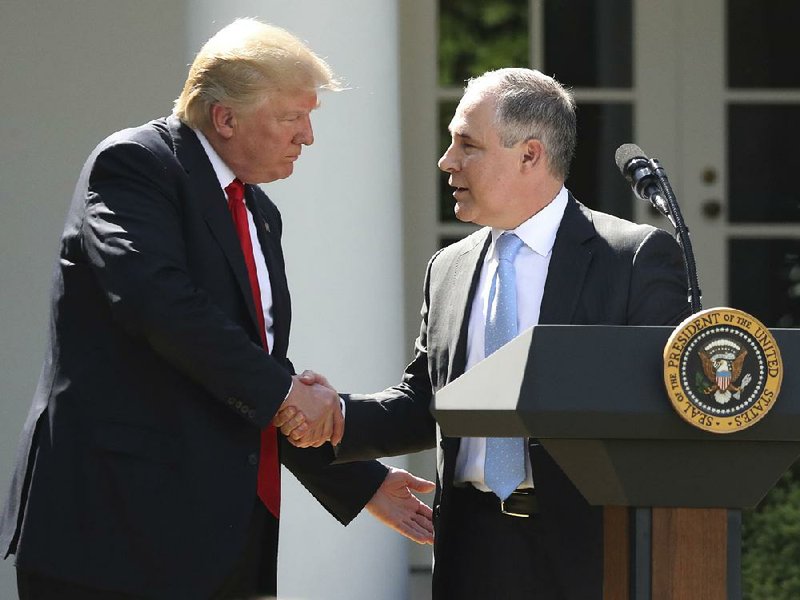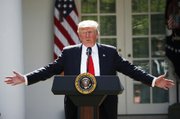WASHINGTON -- President Donald Trump announced Thursday afternoon that he is withdrawing the United States from the landmark Paris climate agreement.
Trump's decision alarmed leaders around the world, drawing swift and sharp condemnation from foreign officials as well as top U.S. environmentalists and corporate titans, who decried the U.S. exit from the Paris accord as an irresponsible abdication of U.S. leadership.
But Trump cast his decision as a "reassertion of America's sovereignty," arguing that the climate pact as negotiated under President Barack Obama was grossly unfair to the U.S. workers he had vowed to protect with his populist "America First" campaign platform.
"I was elected to represent the citizens of Pittsburgh, not Paris," Trump proclaimed in a speech from the Rose Garden of the White House.
[INTERACTIVES: Charts, maps show global warming’s effects]
The United States now joins only two countries -- Nicaragua and Syria -- in opposing a climate agreement reached by all other nations in 2015. The Paris accord was celebrated at the time as a universal response to the global warming crisis.
Trump argued Thursday that the deal had negative ramifications for domestic manufacturing and other industries, and put the United States at a "permanent disadvantage" with China, India and other rising powers. He said the agreement's restrictions on future greenhouse-gas emissions would be tantamount to putting the United States' vast energy resources "under lock and key."
The U.S. withdrawal of the Paris agreement cannot actually be finalized until near the end of Trump's term. In a gesture to those who had encouraged him to remain in the accord, Trump said he was open to negotiating a new climate deal that, in his assessment, would be more fair to U.S. interests.
"In order to fulfill my solemn duty to protect America and its citizens, the United States will withdraw from the Paris climate accord but begin negotiations to re-enter either the Paris accord or an entirely new transaction on terms that are fair to the United States, its businesses, its workers, its people, its taxpayers," Trump said.
[PRESIDENT TRUMP: Timeline, appointments, executive orders + guide to actions in first 100 days]
"We're getting out," he added, "but we will start to negotiate and we will see if we can make a deal that's fair. If we can, that's great. If we can't, that's fine."
Under Obama, the U.S. had agreed under the accord to reduce polluting emissions by about 1.6 billion tons by 2025. But the targets were voluntary, meaning the U.S. and the nearly 200 other nations in the agreement could alter their commitments.
Scientists calculate that a full U.S. withdrawal could result in emissions of up to 3 billion tons of additional carbon dioxide in the air a year -- enough to melt ice sheets faster, raise seas higher and trigger more extreme weather.
More than 190 nations agreed to the accord in December 2015 in Paris, and 147 have since formally ratified or otherwise joined it, including the United States -- representing more than 80 percent of the world's greenhouse-gas emissions.
International treaties have a four-year cooling-off period from the time they go into effect. That means it could take another 3½ years for the U.S. to formally withdraw, though Trump promised to stop implementation immediately.
The U.S. is the world's second-largest emitter of carbon, following only China. Beijing, however, has reaffirmed its commitment to meeting its targets under the Paris accord, recently canceling construction of about 100 coal-fired power plants and investing billions in wind and solar projects.
3 leaders: No renegotiation
The leaders of France, Germany and Italy issued a joint statement voicing "regret" about Trump's move, promising to redouble their efforts to implement the Paris agreement and asserting it cannot be renegotiated.
"We deem the momentum generated in Paris in December 2015 irreversible and we firmly believe that the Paris Agreement cannot be renegotiated, since it is a vital instrument for our planet, societies and economies," read the statement from French President Emmanuel Macron, German Chancellor Angela Merkel and Italian Prime Minister Paolo Gentiloni.
After Trump's speech, Macron spoke with the president by phone for five minutes and "indicated that nothing was renegotiable in the Paris Accords," according to a French official briefed on the conversation.
"The United States and France will continue to work together, but not on the subject of the climate," the official added.
Erik Solheim, executive director of the United Nations Environment Program, said in an interview that "the biggest losers will be the American people."
"It's obviously regrettable," he said. "The world needs American leadership. However, the impact is less than most people would believe, because China, India and Europe will provide leadership."
Miguel Arias Canete, the European Union's commissioner for climate, said Trump's decision had "galvanized us" and promised that "this vacuum will be filled by new broad committed leadership."
Mayors from Sweden to Australia pushed back against the U.S. announcement. "What's heartbreaking is the damage governments can do in a short time when they're in power," said Clover Moore, the mayor of Sydney. "But where national action falters, as we see in the USA tonight, we see more and more city governments stepping up to provide the leadership we urgently need."
At home, the U.S. Conference of Mayors said it strongly opposed the decision and said mayors will continue efforts to reduce greenhouse-gas emissions blamed for global warming. The group's vice president, New Orleans Mayor Mitch Landrieu said the action "is shortsighted and will be devastating to Americans in the long run." In fact, he said, sea level rise caused by unchecked climate change could mean that cities like his "will cease to exist."
Pittsburgh Mayor Bill Peduto, a Democrat, has been an outspoken supporter of the Paris accord, and tweeted after Trump's announcement that "as the Mayor of Pittsburgh, I can assure you that we will follow the guidelines of the Paris Agreement for our people, our economy & future."
Political condemnations of Trump's decision were immediate.
During his presidency and afterward, Obama strongly defended the Paris agreement as a measure to "protect the world we leave to our children." In a statement released Thursday, he said it was the product of "steady, principled American leadership on the world stage," pointing out that it had broad support from the private sector because the accord "opened the floodgates" for high-tech, low-carbon investment and innovation.
"I believe the United States of America should be at the front of the pack," Obama said. "But even in the absence of American leadership; even as this Administration joins a small handful of nations that reject the future; I'm confident that our states, cities, and businesses will step up and do even more to lead the way, and help protect for future generations the one planet we've got."
Former vice president Al Gore, who won a Nobel Peace Prize for his work raising awareness about global warming, said the president's decision was "reckless and indefensible."
"It undermines America's standing in the world and threatens to damage humanity's ability to solve the climate crisis in time," Gore, who called Trump last month to try to persuade him to keep the United States in the Paris agreement, said in a statement.
Global corporations, including oil giants Royal Dutch Shell PLC, ExxonMobil and BP and tech leaders like Apple, had urged the U.S. to remain in the deal.
Jeff Immelt, the chief executive of General Electric, tweeted: "Disappointed with today's decision on the Paris Agreement. Climate change is real. Industry must now lead and not depend on government."
On Capitol Hill, Democrats were fierce in their criticism. Sen. Sheldon Whitehouse, D-R.I., who regularly speaks from the Senate floor about the perils of global warming, said Trump was "betraying the country."
"Ignoring reality and leaving the Paris Agreement could go down as one of the worst foreign policy blunders in our nation's history," Whitehouse said in a statement. "Trump is betraying the country, in the service of Breitbart fake news, the shameless fossil fuel industry, and the Koch brothers' climate denial operation. It's sad."
But Republican congressional leaders praised Trump's move.
Senate Majority Leader Mitch McConnell, R-Ky., said in a statement, "I applaud President Trump and his administration for dealing yet another significant blow to the Obama Administration's assault on domestic energy production and jobs."
House Speaker Paul Ryan, R-Wis., said, "The Paris climate agreement was simply a raw deal for America ... I commend President Trump for fulfilling his commitment to the American people and withdrawing from this bad deal."
In written statements, members of Arkansas' congressional delegation praised Trump for ditching the agreement.
"I'm more worried about what people pay for electricity in Paris, Arkansas, than I am the Paris Climate Accord, which would make them pay a lot more," said Sen. Tom Cotton. "The United States will continue to lead the world in environmental protection & economic might without this lopsided deal."
Sen. John Boozman also was supportive.
"Entering into the Paris climate accord was not in America's best interest and the previous administration should have never taken that action without seeking the Senate's advice and consent," he said.
Audubon Arkansas released a written statement denouncing the decision.
"Arkansas's birds need us now more than ever," said Brett Kincaid, the group's executive director. "Climate change is the number one threat to birds. We now face a much more difficult challenge protecting the birds we know and love."
White House divide
The scene in the Rose Garden was a reflection of the deep divide within the Trump administration over Paris. The president took much of the spring to make up his mind during an intense campaign by both sides to influence his decision.
Secretary of State Rex Tillerson and Ivanka Trump, the president's daughter and adviser, are among those who urged him to stay in the deal, arguing it would be beneficial to the United States to remain part of negotiations and meetings surrounding the agreement as a matter of leverage and influence. Neither was in attendance for Thursday's ceremony.
White House chief strategist Steve Bannon and Environmental Protection Agency Administrator Scott Pruitt pushed for a withdrawal. When Trump announced that he would pull out, there was a burst of applause and some whoops from the assembled crowd in the Rose Garden -- and Bannon held his hands up in the air, clapping enthusiastically.
Introducing Trump, Vice President Mike Pence said the climate decision was an example of the president putting what he sees as the interests of the United States above all else.
"Our president is choosing to put American jobs and American consumers first," Pence said. "Our president is choosing to put American energy and American industry first. And by his action today, President Trump is choosing to put the forgotten men and women first."
Pruitt later commended Trump for his "fortitude, courage and steadfastness" to exit the Paris accord and fulfill a campaign promise.
"You're fighting for the forgotten men and women across this country," Pruitt said of his boss. "This is an historic restoration of American economic independence."
Information for this article was contributed by Philip Rucker, Jenna Johnson, Brady Dennis, Juliet Eilperin, Chris Mooney, Michael Birnbaum and James McAuley of The Washington Post; by Jill Colvin, Julie Pace, Ken Thomas, Erica Werner, Vivian Salama, Michael Biesecker and Seth Borenstein of The Associated Press; and by Somini Sengupta, Melissa Eddy, Chris Buckley, James Kanter and Jason Horowitz of The New York Times.
A Section on 06/02/2017

